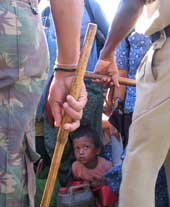 |
| A child peers through the lathis of policemen during Wednesday?s attempt by refugees to cross into India on the way to Bhutan. A Telegraph picture |
Mechi Bridge (India-Nepal border), Aug. 3: The group of 323 had one demand: ?Either we go to our homes in Bhutan or rot here to death.?
But the Nepal and Indian governments would allow neither to homeless Bhutanese refugees. They sent them back packing to their camps in Jhapa, around 40 km from here in eastern Nepal, which they had left this morning with all their belongings ?for good?.
In a major push-in organised by the Bhutan Gorkha National Liberation Front (BGNLF) and supported by the Bhutanese Human Rights? Commission (BHRC), 323 Bhutanese refugees (from four months to 75 years of age), 157 of them women, tried to enter India this afternoon.
The push-in coincided with the visit of Bhutan?s King Jigme Singye Wangchuk to India.
A strong presence of Sashastra Seema Bal (SSB), West Bengal police and the Royal Nepal Police thwarted their plans. The police detained nine persons, including BHRC chairman S.B. Subedi and a few Nepali citizens.
The refugees squatted for four hours, on the heated asphalt of Mechi bridge under the scorching sun, pleading the armed combats to let them in till the Nepal police brought two trucks and a bus in which they were packed off.
 |
?We had specific information that refugees of Beldangi camps I, II and III would try to enter India,? an SSB official said. ?We alerted the police. Given that the push-in was organised by the banned militant outfit BGNLF, we were extra cautious,? he added.
Siliguri additional superintendent of police Tripurari and Kurseong subdivisional police officer Rajesh were there to oversee the police action.
Faced with opposition from the Nepal police, the refugees changed their initial plans to enter India in automobiles. They first tried to enter in ones and twos on foot and in cycle-rickshaws. Since it is not possible to distinguish between a Bhutanese refugee and a Nepali subject, the police began by refusing entry to anyone coming from the other side of the border.
This triggered anger among the Nepali citizens who retaliated by pelting stones on the Indian side, injuring SSB official Tapas Roy, an assistant sub-inspector of police, and three journalists. The Indians too threw back stones at them.
?In order to bring situation under control, we had to detain nine persons, who were trying to vitiate the air,? Darjeeling superintendent of police Rajeev Mishra said.
As a chain effect, hundreds of Nepali citizens took out a rally to protest against the arrests, but a timely intervention by Nepali police stopped them at the Kakarvitta end of the bridge and prevented any flare-up of the situation.
Today?s push-in is being seen as the biggest since 1996 in which refugees had stayed put on the border for several months. This time, the refugees, who had come with all their belongings ? from a rusted Janata stove to a crushed aluminium gagri ? had the same plans till it was foiled completely.
?India is said to be the biggest democracy. How can it support the Bhutan government in such a heinous and undemocratic act?? asked one of them, Uma Shankar Panjiyar.
?Are we asking for too much by wanting to go to our homeland?? said Gopi Maya Gurung, clutching her four-year-old daughter Yamuna.
At the end of today?s drama it was the friendship between nations that emerged as the winner. But for little Yamuna in a red frock, with a face reddened by prickly heat, who was born in the refugee camp, the big question of her identity remained unanswered as ever.
SSB officials said they apprehended more such attempts by the refugees in the near future.
?We are apprehensive that they may change their strategy. Instead of entering together, they may come in small groups, which would be difficult for us to check,? a senior SSB official said.











